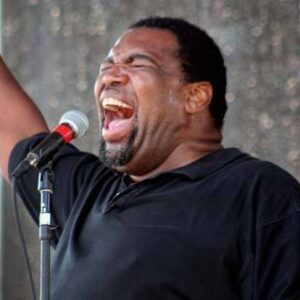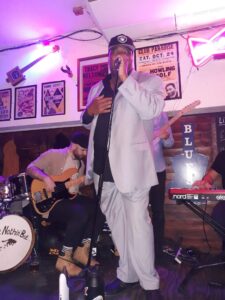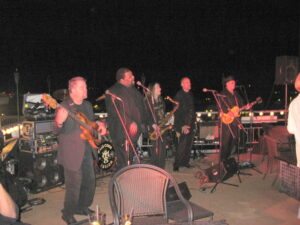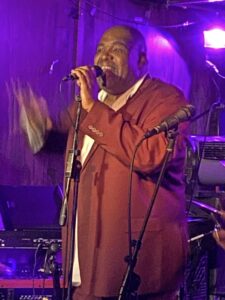Connecticut blues, rock, and soul singer, songwriter, arranger Greg Sherrod has been rocking southern New England for decades. His latest CD Do You Feel It garnered favorable reviews and has served as a successful calling card for Sherrod’s startling good original songs, an amalgamation of blues, rock, and soul. Though this singer has had numerous accomplishments in the past 40 years, Do You Feel It is one of his crowning achievements.
“It’s just a collection of songs.” Sherrod said. “The album was originally supposed to be called Cold Hard Facts. And when we went into the studio, Do You Feel It was just such a strong track. I was like ‘We got to call this album Do You Feel It.’ The track was so representative of the album. It was so perfect. So, that’s what we went with.”
The 51 year old started singing at age nine in school plays. He started writing songs at 16, studying classical voice at 17, performing in bands at 18. Sherrod transitioned from musical theater to bands because he wanted more opportunities to write. “That’s my thing. I love to write songs,” Sherrod said.
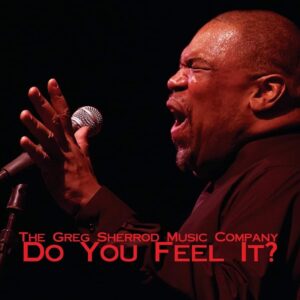 For Sherrod, writing is an existential experience, his way to get through a difficult childhood. Growing up in Milford, Connecticut, the black musician was part of the two percent minority community. Back in 1980, that was not a walk in the park. His mother was an alcoholic with bipolar disorder. She slowly disintegrated to the point she could not work. Sherrod became homeless at 17, until he was taken in by a large Irish Catholic family.
For Sherrod, writing is an existential experience, his way to get through a difficult childhood. Growing up in Milford, Connecticut, the black musician was part of the two percent minority community. Back in 1980, that was not a walk in the park. His mother was an alcoholic with bipolar disorder. She slowly disintegrated to the point she could not work. Sherrod became homeless at 17, until he was taken in by a large Irish Catholic family.
Sherrod recalls with humor a situation that unfurled when he was adopted by his new family. His neighbors had a neighborhood meeting and insisted that his new family not let him live in their house. “I was going to rob them and steal from them and I was going to rape their daughters, and there was going to be a horrible calamity.”
“It was complicated. It was difficult. It was depressing. Music gave me some place to go that was safe,” he said. “It gave me something to do where I could feel like I had some personal value. It really saved my life.”
Instead of being a lifeline to a better world, music became something that let him purge it all. “I didn’t have to carry it around with me if I could get it out,” he said. “It became primal scream therapy.”
His adoptive family was wonderful until he decided to become a musician. He also had a raging drug problem. “The combination of the two was a problem, a bad one, 25 years worth,” he revealed He didn’t get clean until 2021, eleven years ago.
Sherrod had to ask himself what was more important, music or getting high. “I picked music,” the singer said.
Sherrod would like to sell songs at some point, being a prolific songwriter with a back catalog at this point. He’s currently working on two albums to be released this year. One album is ready to go. Sherrod has also been traveling to London, England to play gigs, and he needs a second album for his overseas audience.
“They listen to music that’s completely different. They like boilerplate blues,” Sherrod said. “I went last year and I had two shows in London. Now, I’m in the process of finding six shows in London this summer.”
Sherrod said his audiences are not only receptive, “It’s more like they’re going to carry me down the street on their shoulders,” he said. “Here, a lot of times the audiences aren’t very….they just don’t care. They’ve seen it all. Audiences here are not always engaged, not always. When I go over there, they’re completely engaged and they love it completely.”
During Sherrod’s first visit to London, he visited many of the several open mics in London. He met people there and liked them very much. “It translated into playing shows,” he said.
On his recent album, Do You Feel It, Sherrod features a song about the late Rhode Island singer, Sarah Good. Sherrod said he and Good did not magically hit it off. “She was a force of nature,” he said. “The cool thing is, when she was in her last days, she got to come out and hear me play the song before it was recorded. She died before the album came out. She got to hear it which made me really happy.”
“She needed a song,” Sherrod said. “That song is a force of nature. It’s basically Sarah in a bottle.”
Sherrod’s other big song on Do you Feel It is “Mercy,” which was recorded to honor and impress his idol Robert Cray. “’Mercy’ is me ripping off Robert Cray,” Sherrod admitted. “That’s all it is. I would love to say it has a higher purpose. But, I said ‘How could I write a song Robert Cray would buy and perform. That song was made for him. It’s perfectly in his box. If he sings it, he will be happier than hell.”
Robert Cray is one of Sherrod’s favorite artists, in addition to Aretha Franklin and Stevie Wonder. “It’s an absolute Robert Cray channel,” he freely admits.
When Sherrod’s bands, of which he has two, play out, he rearranges cover songs for his live performances. Arranging is part of what the singer does for a living. A vocal coach, he uses his students for the backing vocals on his albums. “I only do adults and professionals,” Sherrod said.
Sherrod maintains a band in Connecticut and a separate band in Rhode Island. That way, he is the only one who has to travel, which is less expensive. “The bands there are local. They don’t have to drive very far. It works out really well. It’s hard to get guys from New Haven to drive all the way to Providence for a hundred bucks. It’s impossible. Nobody wants to do that.”
Possessessing a high IQ. but saddled with A.D.H.D., Sherrod has spent his whole life cleverly compensating. “It gives me the ability to create all the time,” he said. “I could write an album today. I don’t know how good it would be. But, I could write the whole thing today and finish it. I just have the ability to write songs whenever I’m ready.”
Sherrod, as a youth, learned music by joining every school choir he could find. The singer’s first big break came when he was a member of Sound Of Freedom Youth Choir. Sherrod was noticed by an opera singer who was also a doctor of speech and phrenetics at Columbia University.
“He trained me classically. He wanted me to be an opera singer. That was the beginning of the foundation of my learning music in a very very strict, very very classical and very very European. way Then, I went out in the streets and played in rock bands.”
Wanting to learn blues, Sherrod next went on to Georgia Lewis who became his teacher, his idol, his guardian. This lead Sherrod to participate in a reality TV show called Clash Of The Choirs. Every choir had to have a choir handler. Sherrod’s choir handler, Shelton Beckton, who had handled the Color Purple and The Wiz on Broadway, was a pianist for Debbie Allen and Judy Collins, and a vocal handler for Roberta Flack. “That’s where I got the finishing parts to be a teacher,” Sherrod said.
Sherrod said one of the things that most impacted his career is that he is an African American. Growing up in Milford, Connecticut was not as bad as the last seven years. “Now, there are certain swaths of area in New England that don’t want to hear anything that’s African American,” the singer said. “They don’t want to hear Motown. They don’t want to hear it. They want to hear country. They want to hear classic rock. Or, blues. Up here, blues.”
During this current time in Sherrod’s career, he plays in Providence, Middletown, New Haven, Boston, and New York City.
“I’m not really breaking my butt to play places that are in the woods. Because it’s just too dangerous for me. The cops don’t have any sense of humor when they pull you over at two in the morning and ask you why a black person is in their neighbor hood. And, the pickup truck guys in the middle of the night with the big Trump flags out the back; I don’t want to meet them in some country road in the middle of the night. They could shoot me and get away with it.”
Yet, Sherrod sees a lightening of the racial load in the coming years. He thinks society, despite the political pressure towards division, is becoming more integrated. Because we’re becoming a smaller world, people are finding out about each other and finding out the other is all right.
“That division is starting close a little bit,” he said. “Though the far right is dividing us much as it can, the right middle is starting to self-left. They’re staring to move to the left. Their starting to understand.”
Greg Sherrod will perform at Nick A Nee’s in Providence, Rhode Island on February 18.
